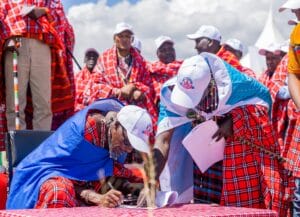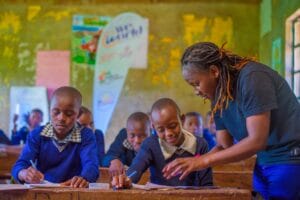
We express our solidarity with all the people affected by the October floods in Bologna and Emilia-Romagna, a phenomenon that has impacted large parts of the region in recent years.
Just hours after the "Policies for Environmental Justice" event organised on Friday, October 18, as part of the WeWorld Festival Bologna, over 17 cm of rain falling between October 19 and 20 — ten centimetres more than the area's historical monthly average.
The climate has changed and the current actions to contain global warming, even adapting to its increasingly frequent and intense impacts, are not enough.
The urgency to act: a discussion between experts, institutions, movements and youth
Environmental justice causes and effects of the climate crisis, land consumption, hydrogeological instability, local and national adaptation and mitigation efforts: these were the very issues that we discussed at the multistakeholder event on 18 October, with a focus on the democratic processes required to address these challenges and the achievement of the 2030 Agenda Goals.
The round table has concluded almost four years of building ambitious transformational processes, multi-stakeholder links and continuous learning together with the European consortium of the project "People & Planet - A Common Destiny", co-financed by the European Commission. Promoted also by Global Citizenship Education "ChangeMakers for Climate Justice" co-funded by the Italian Agency for Development Cooperation and aimed at empowering youth to act as changemakers for climate and social justice, the event has given voice to multiple perspectives, including not only discussions, but also workshops, networking opportunities and informal exchanges.
It was attended by representatives of institutions, civil society, climate movements, and experts: Luigi Di Marco, ASviS Italian Alliance for Sustainable Development; Anna Bombonato, Ministry of the Environment and Energy Security; Marta Ellena, Euro-Mediterranean Centre on Climate Change - CMCC Foundation; Gaia Mongardini, Ultima Generazione; Pasquale Pagano, Extinction Rebellion Bologna; Simone Ogno, ReCommon; Anna Lisa Boni, Councillor of the Municipality of Bologna; Veronica Dini, Centro Studi Systasis; Silvia Tiberti, Councillor of the Municipality of Narni; Giuditta Pellegrini, journalist for Il Manifesto; Alessandro Coltré, Association A Sud. Together with the guests and WeWorld, also Colomba Damiani from Felcos Umbria, People & Planet national partner.
How to act: local action plans, national strategies and global perspectives
The National Sustainable Development Strategy’ (SNSvS) promoted by Italy's Ministry of the Environment and Energy Security, serves as a national coordination tool for integrating the principles of the 2030 Agenda into the country's socio-economic and political landscape. Its 2023 update, shared during the event, outlines key directions to address these challenges, emphasizing policy coherence, sustainability awareness, and an important focus on participation.
However, faster action is urgently needed. Bold decisions must be taken, following the European Union's lead, with measures to ban products linked to deforestation, restore natural habitats, and halt net land consumption in urbanized areas. The issue of land consumption is significant in many parts of Italy, like in Emilia-Romagna, where the Regional Urban Planning Law has lacked effectiveness.
The recurring floods in the region over the past 18 months highlight the need to restore natural river spaces, rethink urban planning, reduce soil sealing, plant trees, and maintain the land. Greater understanding of hydrogeological cycles and global warming effects—warmer seas, heavier rainfall, violent storms, droughts, and heatwaves—is crucial.
At the event, there was also a call to invest in mechanisms to adapt to an already changing climate. On the national level, the Ultima Generazione movement has launched a campaign urging the Italian government to create a Reparation Fund: a 20 billion euro, preventive, and permanent fund to compensate for damages caused by disasters and extreme climatic events. This request aligns with the focus on climate finance at the COP29 in Baku, Azerbaijan.
WeWorld believes it is essential to ensure that the most vulnerable communities, often the least responsible for climate change, do not bear the heaviest consequences. Participatory Adaptation Plans, which we have been promoting for years in many countries, must be developed in all territories. These plans should involve joint efforts between local authorities and civil society, engaging communities to deepen their understanding of their local environments and develop a respectful relationship with nature.
Adaptation, however, is not enough: we must also implement medium- and long-term mitigation and prevention strategies to change production models and lifestyles and consumption in order to contain global warming to within 1.5 degrees Celsius. This goal was reaffirmed by Italy at the 79th United Nations General Assembly in September (current trends will lead to a temperature rise of more than 3°C). Achieving this requires decarbonization, a process that cannot rely solely on individual citizens' conscious choices. While we encourage and support these choices, particularly for vulnerable groups, institutions must hold companies accountable for transitioning to clean energy and sustainable practices. The shift to cleaner alternatives should be prioritized, starting with the highest-emitting companies, and small businesses must be supported with resources. There is good news in this regard: technology and financial resources are available. In 2022, global subsidies for coal, gas, and oil amounted to $7 trillion. Redirecting these funds to renewable energy sources could accelerate their development and replace fossil fuels quickly.
WeWorld believes that the European directive on Corporate Sustainability Due Diligence approved in June 2024, which mandates that large companies and their supply chains respect human and environmental rights, including through emission reduction plans, is an important tool for creating a more sustainable economic system. This directive aligns with the right to protect the environment, biodiversity, and ecosystems for the benefit of current and future generations. It limits private economic interests, as stipulated in Articles 9 and 41 of the Italian Constitution. This is why we are committed to ensuring that this European law is transposed and effectively implemented in Italy, including at the local level.
Our commitment, now and in the future
The 18 October event at the WeWorld Festival in Bologna reflect WeWorld's ongoing and active engagement to promoting youth involvement and participation in climate, environmental and social justice issues.
We strive - and will continue to do so - to raise awareness of the urgency to act for climate, environmental and social justice, strengthen youth activism, and promote confrontation and advocacy initiatives with institutions. Among our keys initiatives are training programmes for young people such as Be A Change Maker, capacity-building initiatives #AllSDGsAreLocal for local governments and the Chiacchierata Attivista (Activist Chat) format, all of which promote participation and dialogue between institutions and citizenship even when they are on different sides. We also contribute to the debate through the publication of documents, toolkits and good practices: at the international level, several publications have been produced as part of the People&Planet project and coordinated by the Portuguese NGO IMVF Instituto Marquês de Valle Flôr.
- Acting Locally Impacting Globally: a wide range of innovative collaborative practices between young citizens and local authorities to promote climate action, fill knowledge gaps and strengthen community engagement.
- Climate Action takes the street, a handbook of tools to organise street actions and workshops aimed at organisations, local authorities, informal groups, operators, movements and individuals to spread awareness on sustainable development issues.
As Margherita Romanelli, WeWorld's Strategic Planning, Advocacy and Partnerships Coordinator, recalled: ‘For years, WeWorld has been acting as a promoter of dialogue between different voices, instances and proposals, which need spaces, place and avenues for integrations to lead to actions that have a concrete result and that start from the real needs of the territories, to the point of providing indications in the definition of a framework of policies and standards at all levels, from the local to the international sphere. We aim to bring the Pact for the Future, signed by the United Nations last September, to our local communities. We believe that this is the only formula for dealing with a complex and multi-faceted situation in which the objectives of justice prevail, starting with the recognition that the environmental crisis does not affect everyone equally.’
Find out more:
Acting Locally, Impacting Globally (IMVF, WeWorld et al, 2024)
Toolkit Climate Action takes the street (IMVF, WeWorld et al, 2024)



